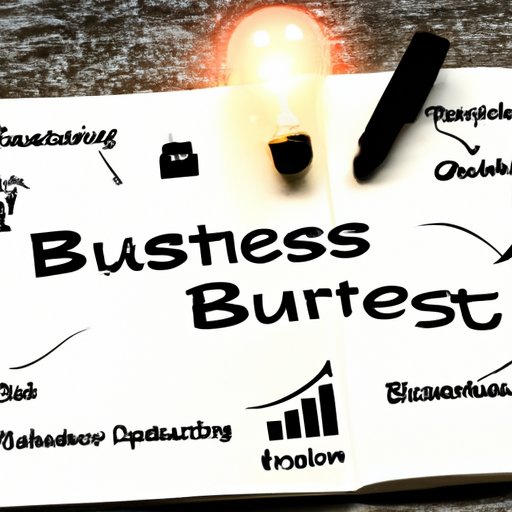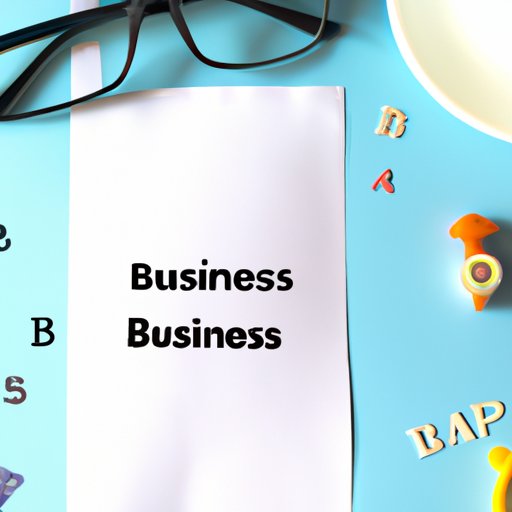Introduction
Starting a business is the dream of many entrepreneurs. However, there are several important steps to consider before taking the plunge. This article will provide an overview of the process for starting a business, from researching your idea to launching and marketing it. Additionally, we’ll discuss the benefits and potential challenges of owning your own business, as well as the necessary resources for success. Lastly, we’ll explain how to develop a business plan and analyze different types of business structures.
What is Starting a Business?
Starting a business means you are taking control of your career and becoming your own boss. It requires research and planning, as well as an understanding of the legal and financial implications. You must determine the type of business you want to start and the products or services you will offer, as well as the structure of your business. You also need to create a business plan, obtain financing, and register your business. Once you have taken these steps, you can build a team, market your business, and launch it.
Why Start Your Own Business?
Starting a business can be a very rewarding experience, both financially and professionally. It gives you the opportunity to pursue a career that you are passionate about, while also providing financial stability. Additionally, owning your own business provides personal satisfaction, as you are in control of your own destiny and can take pride in your accomplishments.
Outline the Steps to Starting a Business
When considering starting a business, there are several key steps to follow. The following outlines the process for launching a successful business:
Research Your Idea
The first step is to research your business idea. You should conduct market research to identify the target audience for your product or service and determine if there is a need for what you are offering. You should also analyze the competition and determine how you can differentiate yourself, as well as create a pricing strategy.
Write a Business Plan
Once you have researched your idea, the next step is to write a business plan. This document should outline your goals, strategies, and expected results. It should include information about the industry, target audience, marketing plans, budget, and financial projections. Writing a business plan is essential for obtaining financing and launching your business.
Register Your Business
The next step is to register your business with the state. This involves filing the required paperwork and paying any applicable fees. Additionally, you may need to obtain licenses or permits depending on the type of business you are starting.
Get Financing
Before launching your business, you need to obtain financing. This may involve applying for loans or seeking investors. You should use your business plan to demonstrate to lenders or investors why your business is worth investing in.
Launch Your Business
Once you have taken the necessary steps to register your business and obtain financing, you can launch your business. This involves creating a website, setting up shop, and starting to promote your business.
Build Your Team
You may need to hire employees to help you run your business. This requires recruiting and training staff, as well as managing payroll and other administrative tasks.
Market Your Business
Marketing is an essential part of launching a successful business. You need to create a marketing plan and decide how you will reach your target audience. You should also develop a social media presence and explore potential partnerships and sponsorships.

Describe the Benefits of Owning Your Own Business
Owning your own business offers several benefits. These include:
Financial Benefits
One of the main benefits of owning your own business is the potential for financial gain. With hard work and dedication, you can turn your business into a profitable venture.
Professional Benefits
Another benefit is professional growth. When you own your own business, you have the opportunity to learn new skills and gain valuable experience. Additionally, you are in control of your own career path and are not reliant on anyone else for job security.
Personal Benefits
Lastly, owning your own business provides personal satisfaction. You can take pride in your accomplishments and enjoy the autonomy that comes with being your own boss.
Discuss Potential Challenges of Starting a Business
Starting a business can also present some challenges. These include:
Legal Challenges
There are several legal considerations when starting a business, such as selecting the right business structure and obtaining the necessary licenses and permits. Additionally, you may need to comply with certain regulations and ensure that your business is protected from liability.
Financial Challenges
Obtaining financing and managing cash flow are two of the biggest financial challenges of running a business. You need to ensure that you have enough capital to cover expenses and manage your finances effectively.
Time Management Challenges
Time management is essential for running a successful business. You need to prioritize tasks and manage your time efficiently in order to achieve your goals.

Highlight Necessary Resources for Starting a Business
In addition to the steps outlined above, there are several resources that can help you start and run a successful business. These include:
Accounting Resources
You need to understand basic accounting principles in order to manage your finances. There are several online resources available to help you learn the basics of accounting and bookkeeping.
Legal Resources
It’s important to understand the legal implications of starting a business. You may need to consult a lawyer or research the laws in your area to ensure that you are compliant.
Financial Resources
Your business needs access to capital in order to operate. There are several sources of financing available, such as loans, grants, and investors. You should research the best option for your business.

Explain How to Develop a Business Plan
A business plan is an essential document for any business. It outlines your goals and strategies and serves as a roadmap for success. The following outlines how to develop a business plan:
Define Your Goals
The first step is to define your goals. What do you want to accomplish with your business? Outline your short-term and long-term goals and create measurable objectives.
Analyze Your Industry
Next, you need to analyze your industry. Research the competition and determine how you can differentiate yourself. Identify trends and opportunities and assess the risks.
Identify Your Target Audience
You also need to identify your target audience. Who are you trying to reach with your product or service? Research their needs and preferences and develop a marketing strategy.
Create a Budget
Lastly, create a budget. Estimate your expenses and income and determine the capital needed to launch and run your business. You should also include a contingency plan in case of unexpected costs or delays.
Analyze Different Types of Business Structures
When starting a business, you need to choose the right business structure. The most common types of business structures are sole proprietorship, partnership, and corporation. Each has its own advantages and disadvantages and you should research each option carefully before making a decision.
Sole Proprietorship
A sole proprietorship is an unincorporated business owned by one person. This is the simplest and least expensive option for starting a business, but it also carries the most risk, as the owner is personally liable for any debts or liabilities associated with the business.
Partnership
A partnership is an unincorporated business owned by two or more people. The partners share profits and losses and are jointly liable for any debts or liabilities associated with the business. This is a good option for businesses that require multiple owners.
Corporation
A corporation is a separate legal entity owned by shareholders. This is the most complex and expensive option, but it provides the most protection for the owners, as they are not personally liable for any debts or liabilities associated with the business.
Conclusion
Starting your own business is an exciting and rewarding experience. However, it requires careful planning and preparation. You need to research your idea and write a business plan, as well as register your business, obtain financing, and launch it. Additionally, you need to consider the benefits and potential challenges of owning your own business, as well as the necessary resources for success. Lastly, you need to analyze different types of business structures and develop a business plan.
With the right steps and resources, you can be well on your way to owning a successful business.
(Note: Is this article not meeting your expectations? Do you have knowledge or insights to share? Unlock new opportunities and expand your reach by joining our authors team. Click Registration to join us and share your expertise with our readers.)
